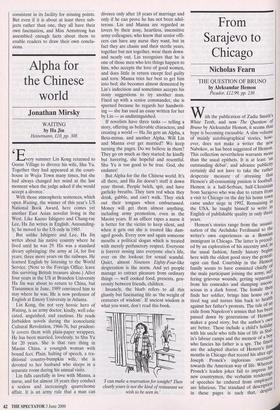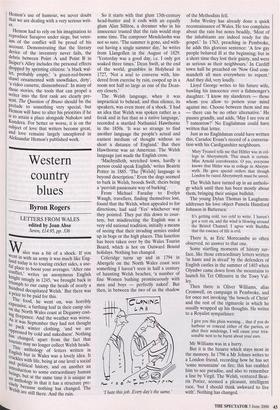From Sarajevo to Chicago
Nicholas Fearn
THE QUESTION OF BRUNO by Aleksandar Hemon Picador, £12.99, pp. 230 With the publication of Zadie Smith's White Teeth, and now The Question of Bruno by Aleksandar Hemon, it seems that hype is becoming excusable. A slim volume of mainly autobiographical stories, how- ever, does not make a writer the new Nabokov, as has been suggested of Hemon. This collection nevertheless warrants more than the usual epithets. It is at least 'all outstanding debut', and advance publicity certainly did not have to take the rather desperate measure of stressing that Hemon's all-consuming passion is football. Hemon is a half-Serbian, half-Ukrainian from Sarajevo who was due to return horn a visit to Chicago on the day his home town came under siege in 1992. Remaining In the USA, he taught himself to write in English of publishable quality in only three years. Hemon's stories range from the assassi- nation of the Archduke Ferdinand to the writer's own experiences as a Bosnian immigrant in Chicago. The latter is precerl: ed by an exploration of his ancestry and,111 the usual fashion, family history begins here with the oldest good story the geneal- ogist can find. Courtship in the Help°, family seems to have consisted chiefly o' the male participant joining the army, suf- fering grievous wounds, getting separated from his comrades and slumping uncon- scious in a dark forest. The female then finds her soldier, brings him home on a tired nag and nurses him back to health against her father's protests. The tale of all exile from Napoleon's armies that has been passed down by generations of Honors makes a good story, but the author's own are better. These include a child's holiday with his uncle who tells him of life in Stal- in's labour camps and the memoir of a boy who fancies his father is a spy. The finest , are the adapted diaries of Hemon's flirt months in Chicago that record his alter ego , Joseph Pronek's inglorious overtures towards the American way of life. Where is Pronek's leaden jokes fail to impress. his new countrymen, the verbatim rendering of speeches he endured from emploY.ers are hilarious. The standard of descriptio. P in these pages is such that, despite Hemon's use of humour, we never doubt that we are dealing with a very serious writ- er.
Hemon had to rely on his imagination to reproduce Sarajevo under siege, but veter- ans of the conflict will be proud of his account. Demonstrating that the literary device of the inventory never fails, the debris between Point A and Point B in Sniper's Alley includes the personal effects dropped by sprinting citizens: 'a black wal- let, probably empty,' a green-red-brown Shawl ornamented with snowflakes, dirty', a video cassette, dismembered'. In many of these stories, the tools that can propel a Writer into the first rank are clearly pre- sent. The Question of Bruno should be the prelude to something very special, but Hemon will have to alter his priorities if he Is to attain a place alongside Nabokov and Kundera. For better or worse, it is on the subject of love that writers become great, and love remains largely unexplored in Aleksandar Hemon's published work.






































































 Previous page
Previous page